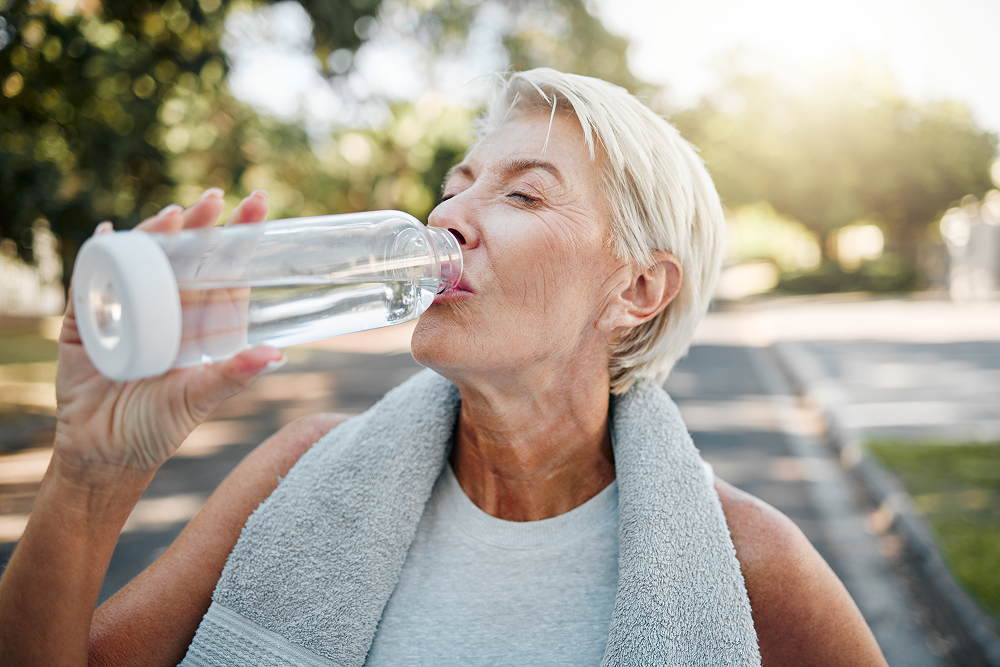The Power of Hydration in Preventing Injuries

When it comes to injury prevention, most people think about warm-ups, strength training, or the right shoes. However, one crucial yet often overlooked factor in preventing injuries is hydration. Proper hydration is essential for maintaining optimal physical performance, ensuring that your muscles, joints, and tissues function at their best. Dehydration, on the other hand, can lead to a host of issues that not only affect your overall health but also increase your risk of injury.
In this article, we’ll explore the critical role of hydration in injury prevention, how dehydration can contribute to injuries, and practical tips for staying properly hydrated, both during workouts and throughout the day.
How Hydration Affects Injury Prevention
The human body is made up of approximately 60% water, and every system, from muscle function to joint lubrication, relies on water to function properly. When you are dehydrated, even a small decrease in fluid levels can have a significant impact on your body’s ability to perform and recover.
Here’s how hydration plays a direct role in injury prevention:
1. Muscular Function and Cramping
Water is essential for maintaining proper muscle function. When muscles don’t receive enough hydration, they become prone to cramps, spasms, and weakness. Dehydrated muscles have less elasticity and are more likely to tear or strain during physical activity.
Injury Prevention Tip: Drink water consistently before, during, and after your workout to ensure your muscles are adequately hydrated, reducing the risk of cramps or strains.
2. Joint Lubrication
Hydration is also key for maintaining the health of your joints. Synovial fluid, the liquid that lubricates your joints, is made up of water, and it helps prevent friction that could otherwise cause wear and tear on the cartilage. Dehydration leads to less synovial fluid, increasing joint stiffness and the risk of conditions like osteoarthritis or other joint injuries.
Injury Prevention Tip: Keep your joints well-lubricated by staying hydrated, especially if you’re engaging in high-impact or repetitive movements like running, cycling, or weightlifting.
3. Temperature Regulation
When you exercise, your body produces heat, and sweating is your body’s natural way of cooling itself down. Dehydration impairs this ability to regulate body temperature, which can lead to overheating, heat exhaustion, or heat stroke. This not only affects performance but can also put you at risk for more severe injuries, such as muscle strains or heat-related illnesses.
Injury Prevention Tip: Ensure proper hydration during physical activities, particularly in hot weather, to help your body stay cool and avoid the detrimental effects of overheating.
4. Tissue Repair and Recovery
Hydration plays a vital role in the body’s ability to repair tissues, including muscles, ligaments, and tendons. Water is essential for nutrient transportation and waste removal from the body, both of which are crucial during the recovery process. A well-hydrated body can heal faster and more effectively, reducing the likelihood of recurring injuries.
Injury Prevention Tip: Drink water throughout the day—not just during workouts—to help your body maintain its hydration levels and promote faster recovery from training.
5. Balance and Coordination
Proper hydration is essential for optimal cognitive and motor function. Dehydration can impair focus, coordination, and balance, all of which are crucial for avoiding falls and injury. A lack of hydration can cause fatigue, dizziness, or difficulty concentrating, which can lead to accidents or incorrect movement patterns.
Injury Prevention Tip: Drink enough water to stay mentally alert and focused during physical activities. This can help you maintain good form and balance, reducing your injury risk.
How Dehydration Contributes to Injury Risk
The body’s reliance on hydration for proper function means that even mild dehydration can have a significant impact on your injury risk. Here are some of the ways dehydration can contribute to injury:
1. Increased Muscle Fatigue
Dehydrated muscles are less efficient at contracting and relaxing, which means they tire out more quickly. When muscles become fatigued, they are more likely to make mistakes, such as poor posture or incorrect form, increasing the risk of strains, sprains, or overuse injuries.
2. Reduced Flexibility
Hydration is also critical for maintaining muscle flexibility. Dehydrated muscles are stiffer and less flexible, making them more prone to injury during stretching or intense activity. This can increase the likelihood of muscle tears, ligament sprains, and other soft tissue injuries.
3. Altered Circulation
Dehydration affects the blood’s ability to circulate efficiently throughout the body. As the body loses water, blood volume decreases, leading to a reduction in the oxygen and nutrients that are delivered to your muscles and tissues. Poor circulation means muscles become fatigued more quickly, and recovery from exercise is delayed, which can increase the risk of injury.
4. Overheating
When your body is dehydrated, your sweat rate decreases, impairing your body’s ability to cool itself effectively. Overheating can lead to heat exhaustion or heat stroke, both of which can cause dizziness, nausea, and extreme fatigue, impairing your ability to perform at your best and putting you at risk for falls or accidents.
5. Impaired Joint Health
As mentioned earlier, joint health is directly linked to hydration. Without adequate fluid levels, joints lose their natural lubrication, making them more vulnerable to friction, wear, and tear. This increases the likelihood of injuries like tendonitis, bursitis, or even long-term damage to cartilage, which can lead to osteoarthritis.
How to Stay Hydrated for Injury Prevention
Now that we know how hydration affects injury prevention, let’s look at practical tips to ensure you’re staying properly hydrated throughout the day, especially during workouts:
1. Drink Water Regularly
Aim to drink water consistently throughout the day—not just when you’re thirsty. Your body is constantly losing water through sweat, urine, and breathing, so it’s important to replenish your fluids regularly. A good rule of thumb is to aim for 8 cups (64 ounces) of water per day, but this may vary depending on activity levels, climate, and individual needs.
2. Hydrate Before, During, and After Exercise
It’s important to hydrate before you start exercising, to keep your body fueled during your workout, and to rehydrate afterward to aid in recovery. Try to drink about 16-20 ounces of water 1-2 hours before exercise, 7-10 ounces every 10-20 minutes during exercise, and 16-24 ounces after exercise to replace lost fluids.
3. Use Electrolyte Drinks for Intense Activity
During long or intense workouts (especially in hot weather), plain water may not be enough to replace the fluids and electrolytes (like sodium, potassium, and magnesium) that your body loses through sweat. In these cases, consider an electrolyte drink to help restore balance and prevent cramping or dehydration.
4. Pay Attention to Your Urine Color
One of the easiest ways to gauge hydration levels is to monitor the color of your urine. Clear or light yellow urine generally indicates adequate hydration, while dark yellow or amber urine can signal dehydration. If your urine is dark, it’s time to increase your fluid intake.
5. Avoid Caffeinated and Alcoholic Beverages
Both caffeine and alcohol have diuretic effects, meaning they can increase urine production and lead to dehydration. If you’re engaging in physical activity or trying to stay hydrated, limit your intake of caffeinated or alcoholic beverages and focus on water or hydrating drinks instead.
Stay Hydrated, Stay Injury-Free
Hydration plays a critical role in injury prevention by supporting muscle function, joint health, temperature regulation, and overall movement efficiency. By drinking enough water throughout the day and staying hydrated during exercise, you can improve your performance, reduce fatigue, and decrease the likelihood of injury.
Need Help Preventing Injuries? Book Your Free Consultation Today!
At Precision Performance Physical Therapy, we believe that injury prevention is a key part of maintaining a healthy and active lifestyle. If you’re concerned about your hydration habits or need help with injury prevention strategies, our experienced physical therapists are here to guide you. We offer free consultations to assess your hydration, movement patterns, and injury risk. We’ll help you create a personalized plan to stay hydrated and avoid injuries, so you can perform at your best.
Book your free consultation today and take the first step toward staying injury-free and performing at your peak!
Hydration is essential for injury prevention—don’t underestimate the power of water!
